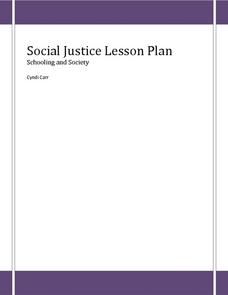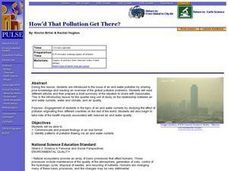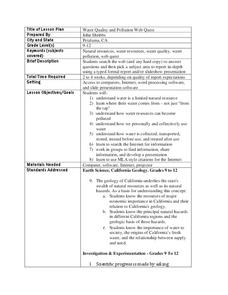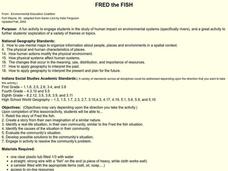Redefining Progress
Have and Have-Not
Is there a correlation between a country's wealth and the extent of its ecological footprint? What exactly constitutes an ecological footprint, and how does one country stack up against the rest? This is a unique instructional activity...
Curated OER
Leach Out and Touch Someone
Students discuss how groundwater becomes polluted. In groups, they design and create models of groundwater pollution sources. They demonstrate to the class how the water may become contaminated from local and nonlocal pollution sources.
Curated OER
You Are What You Drink!
Students explore water treatment systems. In this water conservation ecology lesson plan, students identify and explain several processes used for water treatment and define related vocabulary after listening to content information given...
Curated OER
Dirty Water
Students, through a case study of actual water sources in Washington State, identify major sources of aquatic pollution. They also categorize pollutants, make inferences about the effects of pollutants on the environment and construct...
Curated OER
Easy Street
Young scholars work together to complete a simulation on drought days. As a class, they discuss their results and compare water usage of the past to current numbers. After reading short excerpts, they answer discussion questions and...
Curated OER
Salt Marsh in a Pan
Students create a model of a salt marsh to discover the impact of pollution and human activities on water-based habitats including bays and the ocean. They recognize the relationship between natural and developed areas. Students impact...
Curated OER
Pollution
Third graders investigate pollution. They discuss pollution and its effects. They create a Venn diagram of pollution and people polluting. They create a landfill and predict what will occur over a week's time. They create two air...
Curated OER
Where Do We Get Clean Water?
Students investigate the concept of a filter. They use simple supplies in order to construct one after watching a demonstration performed by the teacher. An important warning that the project water is not clean for drinking is included....
Curated OER
Human Impact on the Environment and Pollution
Pupils illustrate the impact humans have on the environment through analogies and models. They observe demonstrations of human impact and pollution and create a composite picture of how people can have an impact on their environment.
Curated OER
Water Issues on Puerto Rico and Oahu: A Comparison of Two Islands
Fifth graders explore how the tow islands receive and use fresh water. They also address some of the threats to the fresh water supply on each island. Students explore the lesson objectives through water cycle models and experiments.
Curated OER
The Affect of Water Temperature on Living Organisms
Students examine the environmental impact of global warming. In this environmental science lesson, students design and conduct an experiment about the effect of temperature on paramecia. They write a lab report about their experiment.
Curated OER
Social Justice-Water in Developing Countries
Young scholars explore how water shortage affects everyday life. In this social justice lesson, students discuss information about water shortage in Ghana. A water shortage simulation/game is played in which a "Canadian" team starts with...
Curated OER
What Happened to the Water? Designing Ways to Get and Clean Water
Students design ways to clean a water source or find a new water source depending on various hypothetical family scenarios. They draw and write about how to provide water to a community facing a water crisis, and present their solutions...
Curated OER
Who Dirtied The Water/Clean Water: Is It Drinkable?
Students enter the room, receive a film canister that contains materials that be added to the dirty water bell jar. They record on their data table who or what is doing the adding and the actual substance that has been added to the bell...
Curated OER
Environment: How'd That Pollution Get There?
Young scholars examine how global wind and water patterns aid in the spread of worldwide pollution. In groups, they read articles about the domino effect of pollution and create posters displaying its journey. On blank world maps,...
Curated OER
All Hands on Deck: A Harbor Education Program
Pupils build a model of an estuary. In this wetland instructional activity, students build a model estuary with a paint tray and modeling clay. They use the model to illustrate the impact of non-point pollution on the watershed.
Curated OER
Water Quality and Pollution Web Quest
Learners explore how water is a limited resource, where it comes from, how it can become polluted and how it is used. In this water quality instructional activity students search the web to answer given questions and prepare a report...
Curated OER
Clean Water vs. Dirty Water
Students study the importance of clean water to the survival of organisms and what activiities and material pollute water. They measure the temperature of water samples and create a class graph.
Curated OER
Straining out the Dirt
Students design and construct a water filter using activated carbon, cotton and other materials to remove chocolate powder from water. They test and record their observations, and complete a KWL chart.
Curated OER
Let us Help
Students explore water conservation. In this ecology and civic responsibility lesson, students identify agencies that monitor and help improve water quality and describe what they do. Students research these organizations and work in...
Curated OER
Save the Bay
Students explore the concept of environmental stewardship. In this science lesson, students examine the environmental effects of oil spills as they replicate a contained oil spill and clean up.
Curated OER
The Water Cycle - Family Page
Learners discuss the steps of the water cycle. They create their own model of the water cycle. They complete the Family Page at the end of the lesson.
Curated OER
Oil Spill Activity (Easy)
Students explore the concept of environmental stewardship. In this science lesson, students examine the effects of oil spills and investigate clean-up methods as they participate in a hands-on activity.
Curated OER
FRED the FISH
Young scholars engage in the study of the human impact on environmental systems (specifically rivers). This instructional activity enhances Students' exploration of a variety of themes or topics.

























